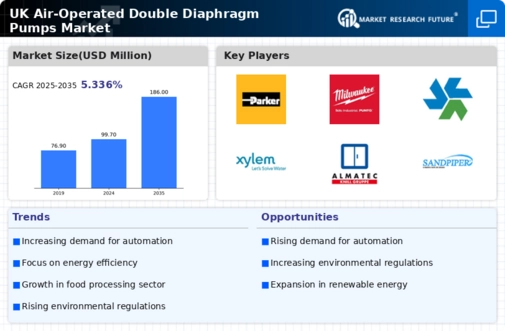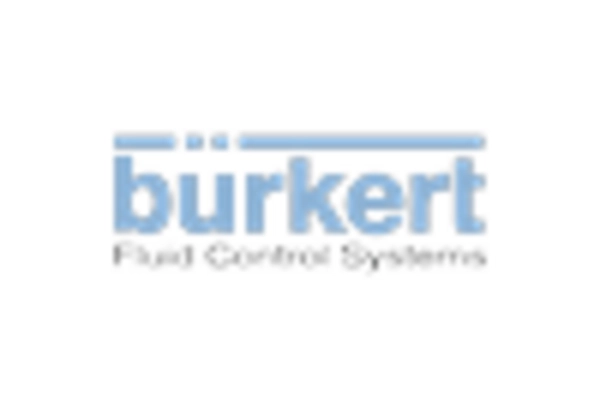Increased Focus on Energy Efficiency
The air operated-double-diaphragm-pumps market is witnessing a shift towards energy efficiency as industries strive to reduce operational costs and environmental impact. With rising energy prices and stringent regulations on energy consumption, companies are increasingly seeking pumping solutions that offer lower energy usage without compromising performance. Air operated-double-diaphragm pumps are known for their energy-efficient operation, which can lead to cost savings of up to 30% compared to traditional pumping systems. This focus on energy efficiency is likely to drive the adoption of these pumps across various sectors, including manufacturing and construction, thereby enhancing the market's growth potential.
Rising Demand in Chemical Processing
The air operated-double-diaphragm-pumps market is experiencing a notable increase in demand within the chemical processing sector. This growth is primarily driven by the need for efficient and reliable fluid transfer solutions in various applications, including the handling of corrosive and viscous materials. The market for chemical processing in the UK is projected to expand at a CAGR of approximately 4.5% over the next five years, indicating a robust environment for air operated-double-diaphragm pumps. These pumps are particularly valued for their ability to operate without electricity, making them suitable for hazardous environments. As industries seek to enhance operational efficiency and safety, the adoption of air operated-double-diaphragm pumps is likely to rise, further solidifying their position in the market.
Expansion of Food and Beverage Industry
The air operated-double-diaphragm-pumps market is benefiting from the expansion of the food and beverage industry in the UK. As consumer preferences shift towards processed and packaged foods, manufacturers are increasingly investing in advanced pumping technologies to ensure product quality and safety. The food and beverage sector is projected to grow at a CAGR of around 3.8% in the coming years, which is likely to enhance the demand for air operated-double-diaphragm pumps. These pumps are particularly advantageous for handling food-grade materials, as they can be easily cleaned and maintained, thus ensuring compliance with stringent hygiene standards. This trend indicates a promising outlook for the air operated-double-diaphragm-pumps market as it aligns with industry needs.
Technological Innovations in Pump Design
The air operated-double-diaphragm-pumps market is being propelled by ongoing technological innovations in pump design and materials. Manufacturers are increasingly developing pumps that are lighter, more durable, and capable of handling a wider range of fluids. Innovations such as advanced diaphragm materials and improved sealing technologies are enhancing the performance and reliability of these pumps. As industries demand more versatile and efficient pumping solutions, the air operated-double-diaphragm-pumps market is likely to benefit from these advancements. The introduction of smart pump technologies, which allow for real-time monitoring and control, may further enhance operational efficiency and safety, positioning the market for continued growth.
Growth in Water and Wastewater Management
The air operated-double-diaphragm-pumps market is significantly influenced by the increasing focus on water and wastewater management in the UK. With the government investing heavily in infrastructure improvements and environmental sustainability, the demand for efficient pumping solutions is on the rise. The UK water sector is expected to see investments exceeding £50 billion over the next decade, which will likely drive the adoption of air operated-double-diaphragm pumps. These pumps are particularly effective in transferring sludges and other challenging fluids, making them ideal for wastewater treatment facilities. As regulatory pressures mount to improve water quality and reduce environmental impact, the air operated-double-diaphragm-pumps market is poised for substantial growth.
















